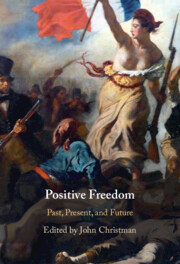Book contents
- Positive Freedom
- Positive Freedom
- Copyright page
- Contents
- Contributors
- Acknowledgments
- Introduction The Multiple Dimensions of Positive Freedom
- Chapter 1 Unity and Disunity in the Positive Tradition
- Chapter 2 Positive Liberty as Realizing the Essence of Man
- Chapter 3 Moral and Personal Positive Freedom
- Chapter 4 Positive Freedom and Freedom of Contract
- Chapter 5 Recognition and Positive Freedom
- Chapter 6 Self-Mastery and the Quality of a Life
- Chapter 7 Basic Freedom in the Real World
- Chapter 8 Reframing Democracy with Positive Freedom
- Chapter 9 Disability and Positive Liberty
- Chapter 10 Positive Freedom and Paternalism
- Chapter 11 Beyond Positive and Negative Liberty
- Chapter 12 Property and Political Power
- Chapter 13 Public Reason, Positive Liberty, and Legitimacy
- Works Cited
- Index
Chapter 2 - Positive Liberty as Realizing the Essence of Man
Published online by Cambridge University Press: 03 September 2021
- Positive Freedom
- Positive Freedom
- Copyright page
- Contents
- Contributors
- Acknowledgments
- Introduction The Multiple Dimensions of Positive Freedom
- Chapter 1 Unity and Disunity in the Positive Tradition
- Chapter 2 Positive Liberty as Realizing the Essence of Man
- Chapter 3 Moral and Personal Positive Freedom
- Chapter 4 Positive Freedom and Freedom of Contract
- Chapter 5 Recognition and Positive Freedom
- Chapter 6 Self-Mastery and the Quality of a Life
- Chapter 7 Basic Freedom in the Real World
- Chapter 8 Reframing Democracy with Positive Freedom
- Chapter 9 Disability and Positive Liberty
- Chapter 10 Positive Freedom and Paternalism
- Chapter 11 Beyond Positive and Negative Liberty
- Chapter 12 Property and Political Power
- Chapter 13 Public Reason, Positive Liberty, and Legitimacy
- Works Cited
- Index
Summary
In his philosophical writings, Marx develops a conception of self-realization which includes a conception of positive liberty. Based on his critique of deontological ethics and law he rejects the idea that negative liberty is sufficient to realize emancipation and to overcome alienation. In the central concepts of Marx's philosophical anthropology (alienation, recognition, species being), a conception of positive liberty is integrated which will be made explicit here. In the third part of my chapter, it is shown that in his program of a critique of political economy Marx also uses a conception of positive liberty as a guiding principle. In the fourth part, the way in which Marx's conception of positive liberty fits into a philosophical tradition that can be labeled as "post-kantian perfectionism" is discussed. In the final fifth part, two fundamental problems in Marx's conception are considered and it will be shown why and in which sense the conception of positive liberty identifiable in Marx is systematically still important (if some philosophical corrections need to be made).
- Type
- Chapter
- Information
- Positive FreedomPast, Present, and Future, pp. 28 - 44Publisher: Cambridge University PressPrint publication year: 2021
- 1
- Cited by

